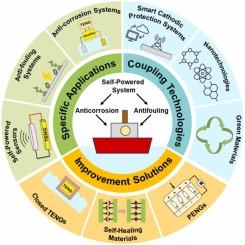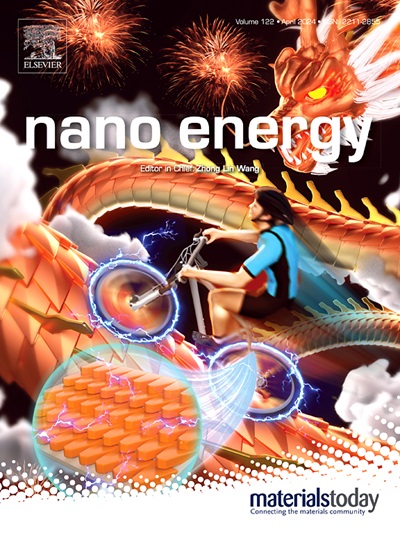海洋腐蚀与结垢控制的自供电电化学保护:原理、进展与展望
IF 16.8
1区 材料科学
Q1 CHEMISTRY, PHYSICAL
引用次数: 0
摘要
提高海洋环境中的防腐和防污性能对于可持续发展至关重要。传统的电化学保护系统依赖外部电源,成本高昂,维护负担重。相比之下,利用压电纳米发电机(PENGs)和三电纳米发电机(TENGs)的自供电电化学保护系统可利用环境能源提供阴极保护和防止污垢。这种方法为未来的海洋保护提供了一种可持续的、前景广阔的替代方案。本综述探讨了这些自供电系统的原理、进展、应用和耦合技术。主要应用包括防腐蚀、防污和自供电传感,而与互联网技术、纳米技术和绿色材料的集成则提高了系统的智能、性能和环境可持续性。对这些技术的生态效益进行了批判性评估,强调了它们作为海洋可持续发展变革性解决方案的潜力。未来的研究应优先发展创新材料、智能系统集成和多功能设计,以充分实现海洋环境中自供电电化学保护的潜力。本文章由计算机程序翻译,如有差异,请以英文原文为准。

Self-Powered Electrochemical Protection for Marine Corrosion and Fouling Control: Principles, Advances, and Prospects
Improving anti-corrosion and anti-fouling performance in marine environments is vital for sustainable development. Traditional electrochemical protection depends on external power sources, leading to high costs and maintenance burdens. In contrast, self-powered electrochemical protection systems, utilizing piezoelectric nanogenerators (PENGs) and triboelectric nanogenerators (TENGs), harness environmental energy to provide cathodic protection and prevent fouling. This approach offers a sustainable and promising alternative for future marine protection. This review explores the principles, advancements, applications and coupling technologies of these self-powered systems. Key applications include anti-corrosion, anti-fouling, and self-powered sensing, while integration with internet technologies, nanotechnologies, and green materials enhances system intelligence, performance, and environmental sustainability. The ecological benefits of these technologies are critically assessed, highlighting their potential as transformative solutions for marine sustainability. Future research should prioritize the development of innovative materials, intelligent system integration, and multifunctional designs to fully realize the potential of self-powered electrochemical protection in marine settings.
求助全文
通过发布文献求助,成功后即可免费获取论文全文。
去求助
来源期刊

Nano Energy
CHEMISTRY, PHYSICAL-NANOSCIENCE & NANOTECHNOLOGY
CiteScore
30.30
自引率
7.40%
发文量
1207
审稿时长
23 days
期刊介绍:
Nano Energy is a multidisciplinary, rapid-publication forum of original peer-reviewed contributions on the science and engineering of nanomaterials and nanodevices used in all forms of energy harvesting, conversion, storage, utilization and policy. Through its mixture of articles, reviews, communications, research news, and information on key developments, Nano Energy provides a comprehensive coverage of this exciting and dynamic field which joins nanoscience and nanotechnology with energy science. The journal is relevant to all those who are interested in nanomaterials solutions to the energy problem.
Nano Energy publishes original experimental and theoretical research on all aspects of energy-related research which utilizes nanomaterials and nanotechnology. Manuscripts of four types are considered: review articles which inform readers of the latest research and advances in energy science; rapid communications which feature exciting research breakthroughs in the field; full-length articles which report comprehensive research developments; and news and opinions which comment on topical issues or express views on the developments in related fields.
 求助内容:
求助内容: 应助结果提醒方式:
应助结果提醒方式:


